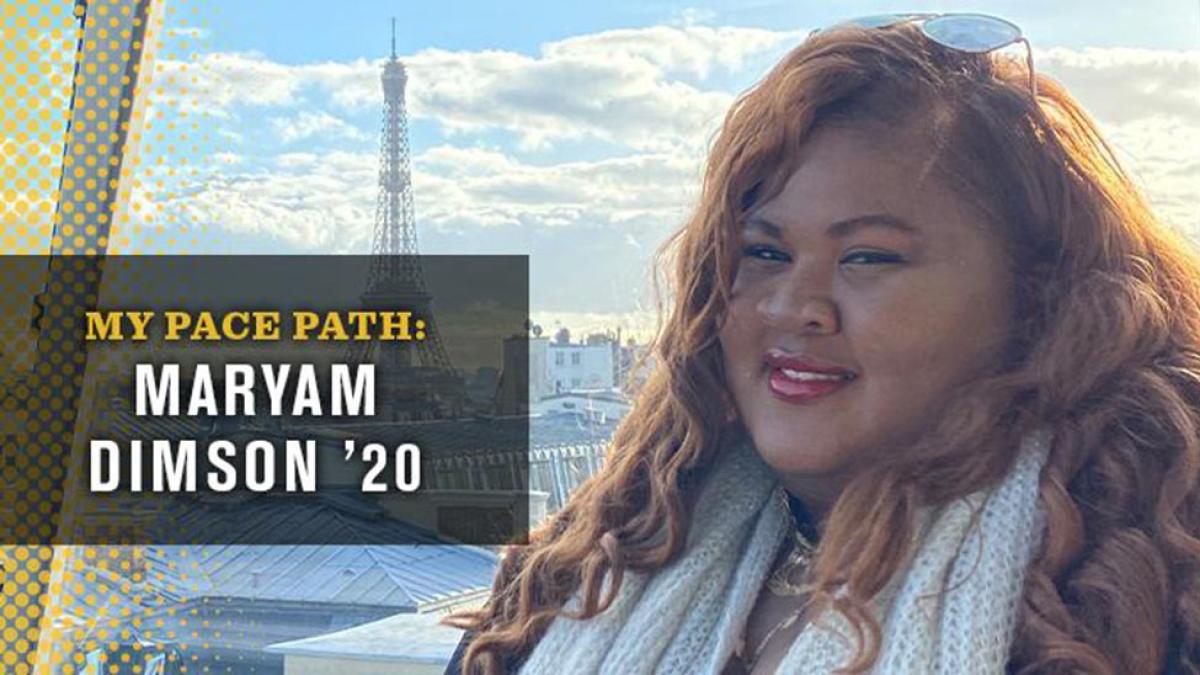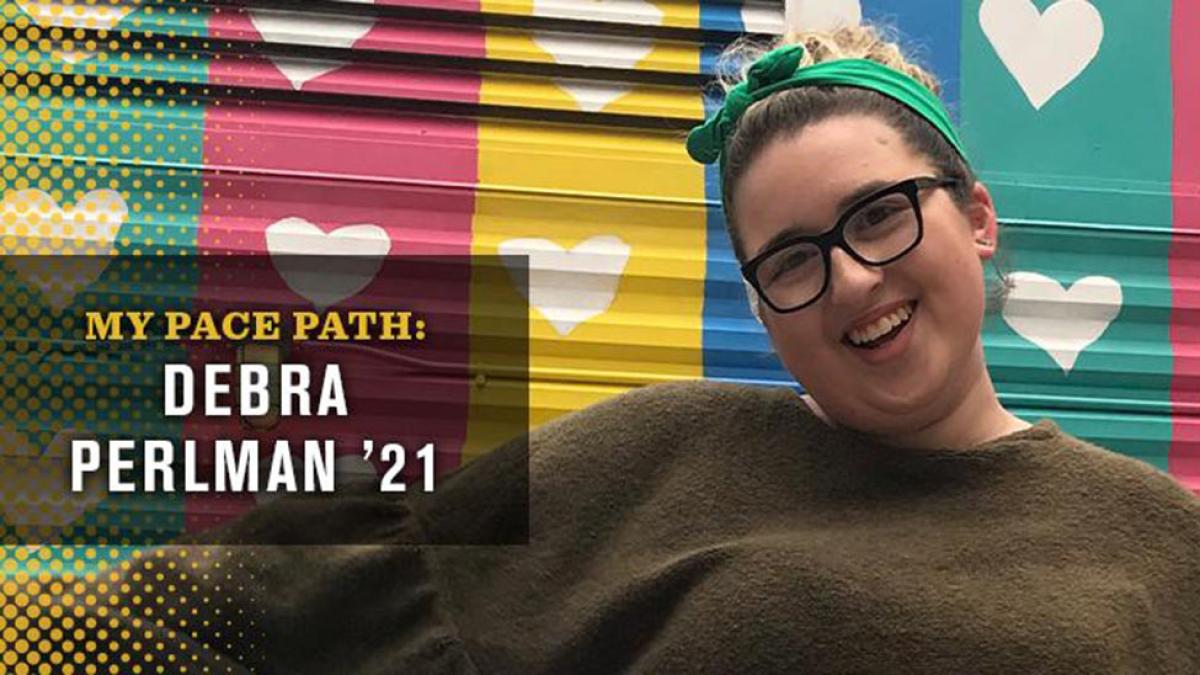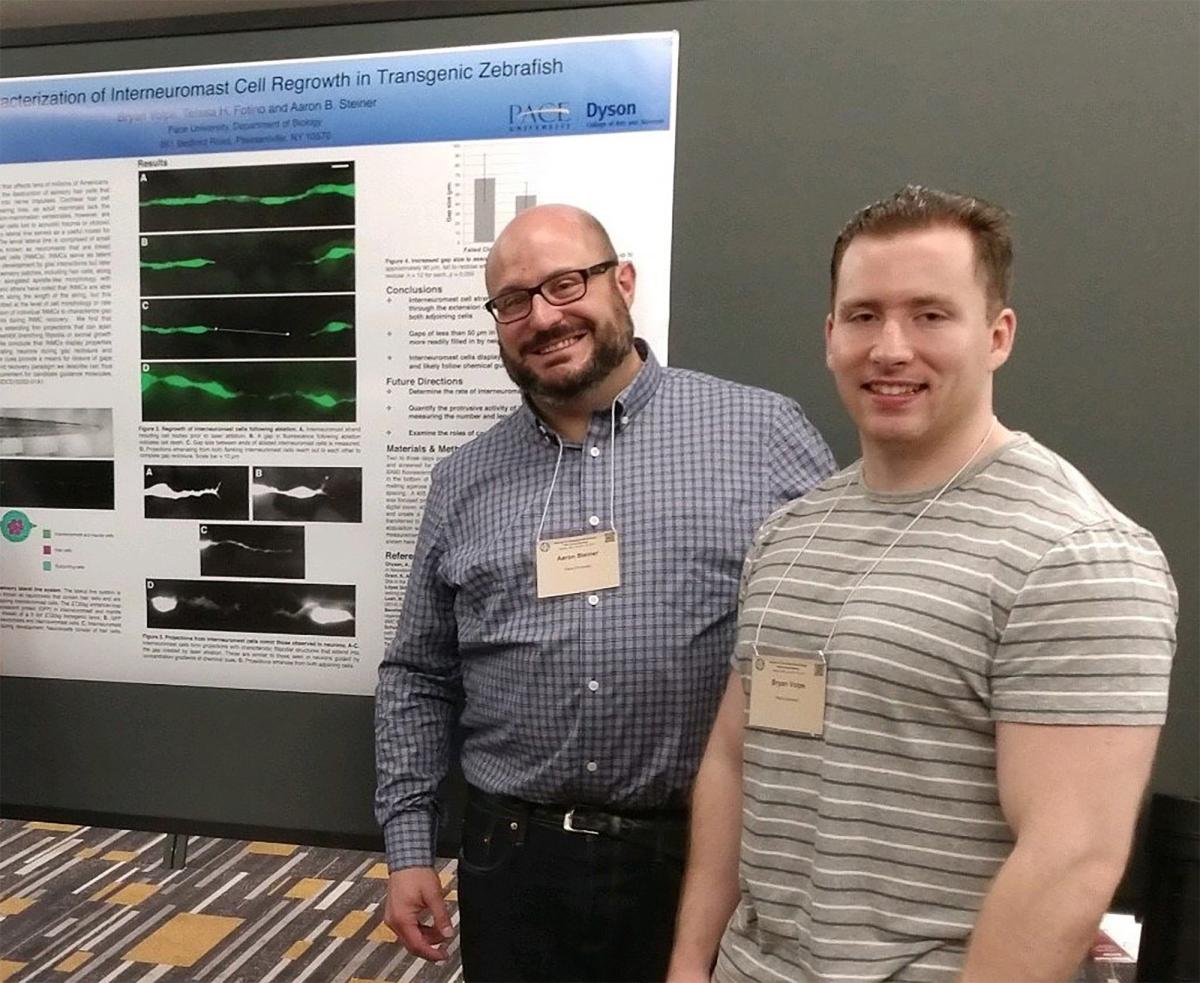
The Pioneering Physician Assistant
Soon-to-be double alumna Jessica Jiménez ’19 first earned her BA in Psychology from Pace, only to pursue the competitive MS in Physician Assistant Studies, which she’ll be graduating from December 2019. Talk about ambition!
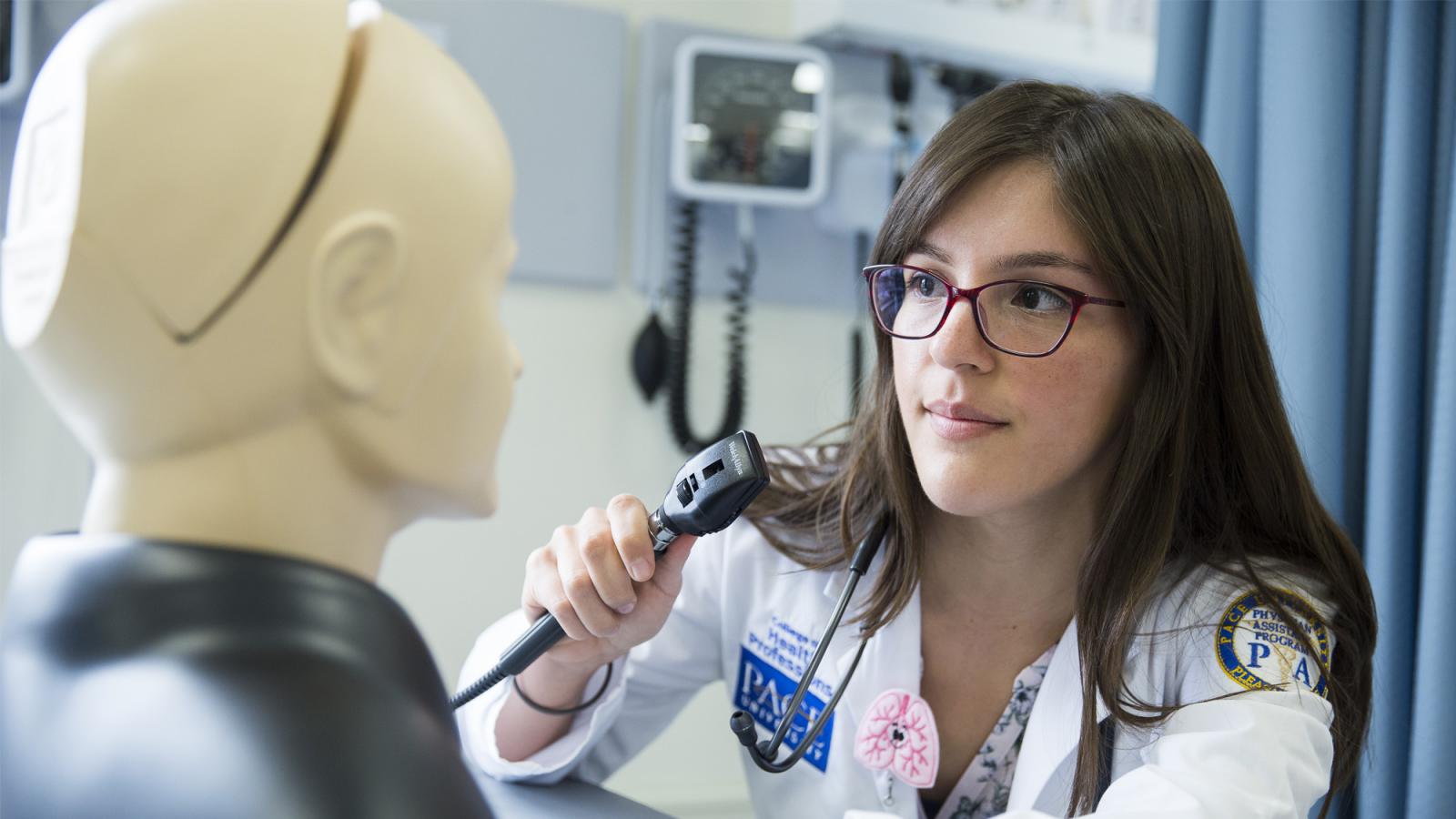
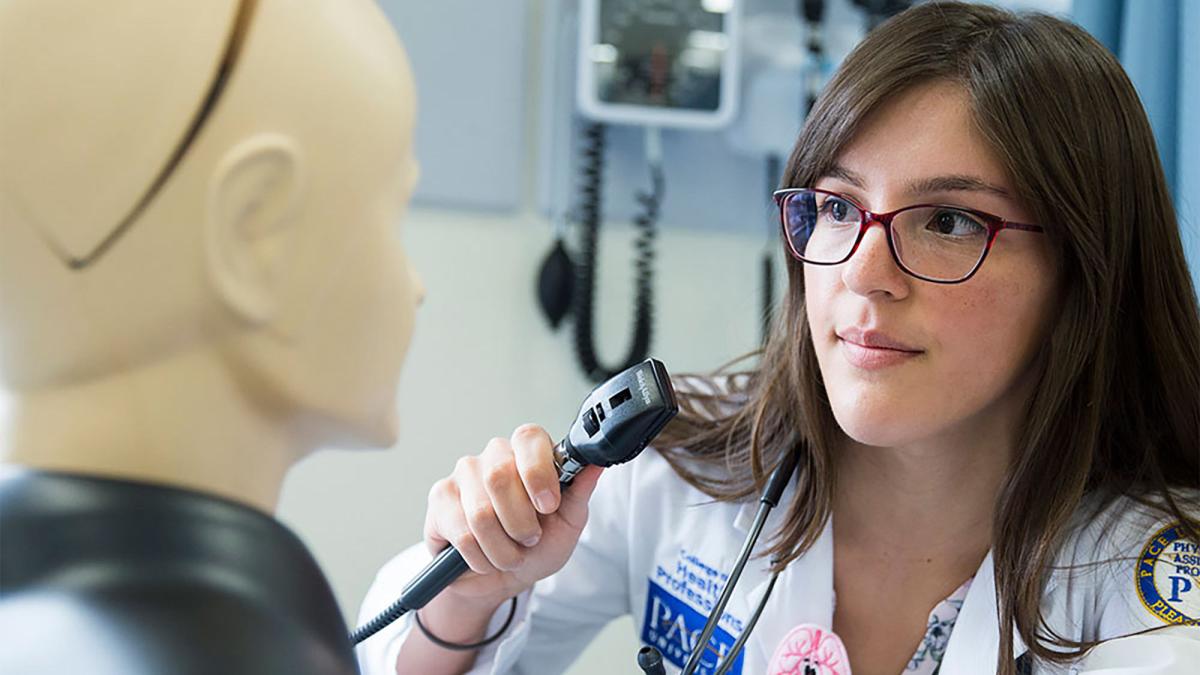
Jessica Jiménez ’19 knew about Pace well before she enrolled. “My father learned English as a second language [on the] New York City Campus when he came here from Mexico,” she told us. Her mother and older sister graduated from Pace, too, and were supportive of Jiménez’s decision to apply. “They always talked about Pace with such pride,” she said, a legacy she would easily live up to when pursuing her BA in Psychology. Jiménez was named one of Pace’s Top 100 Scholars in 2016, received Dean’s List First Honors four times, won first place in the English Department’s Writing Contest for poetry, and also won for an experimental psychology research paper in the Writing Enhanced Course Contest, which was presented at the Annual Pace Psychology Conference. Talk about work ethic!
She cited her professors as just one of the many reasons why she ultimately decided to pursue a master’s degree at Pace as well, saying that, “I believed that Pace’s graduate professors would be just as good—if not better.” Her new focus? The recently launched Physician Assistant (PA) program on the Pleasantville Campus. “I had to take numerous science prerequisites,” Jiménez explained, who also worked as a physical therapy aide all while maintaining a 4.0 GPA.
“The biological and pathological components of medicine have always fascinated me,” she said, but it was the team aspect of the work that also sparked her interest in pursuing the career. That and their dizzying breadth of knowledge across a variety of medical specialties. “There are many callings in life,” Jiménez told us, “but for me, they all pale in comparison to the skilled care and healing touch that a PA can provide to so many people.”
It was that level of dedication and a desire to lend her skills for the greater good that she took up the mantle of Historian and NYS Chapter Representative of the PA program on the Pleasantville Campus, becoming a leader for her peers. “I wanted to be a part of that impact to set an example for future students,” she explained. “Everything we do reflects on our program, and since we are the first class, first impressions are crucial to succeed.”
Currently, Jiménez is in the clinical phase of the rigorous 27-month PA program. In general surgery alone, she faced a challenging schedule beginning in the early morning hours and working well into the evening, covering “trauma, acute care, minimally invasive, and vascular surgeries (including a 24-hour shift), as well as completing projects at night for my surgeons, creating a presentation for my class, and studying every day for my end of surgery exam.” Whew!
During one of those many surgery rotations, Jiménez encountered a patient and his wife who were both extremely nervous about his upcoming procedure. “I volunteered to wait with [them] until a medical transporter came to take him to the operating room,” she said, explaining that she listened carefully to the couple’s concerns. “I reassured them that they [were] in good hands, [and] mentioned how I saw a lot of people who maintained a good quality of life after,” as Jiménez was very familiar with this particular procedure. “I went with him down to pre op and the couple said they felt better knowing that I was going to be there surgically assisting in the operating room.”
We know Jiménez will go on to help countless others in her medical career, and we’re excited to hear more about what will undoubtedly be a bright future for her.
The Motivational MD
Bryan Volpe ’20 is on the research team studying zebrafish in hopes of one day helping those affected by hearing loss. He’s also completed a staggering 561 hours at a local hospital—and he’s got his eye on med school.
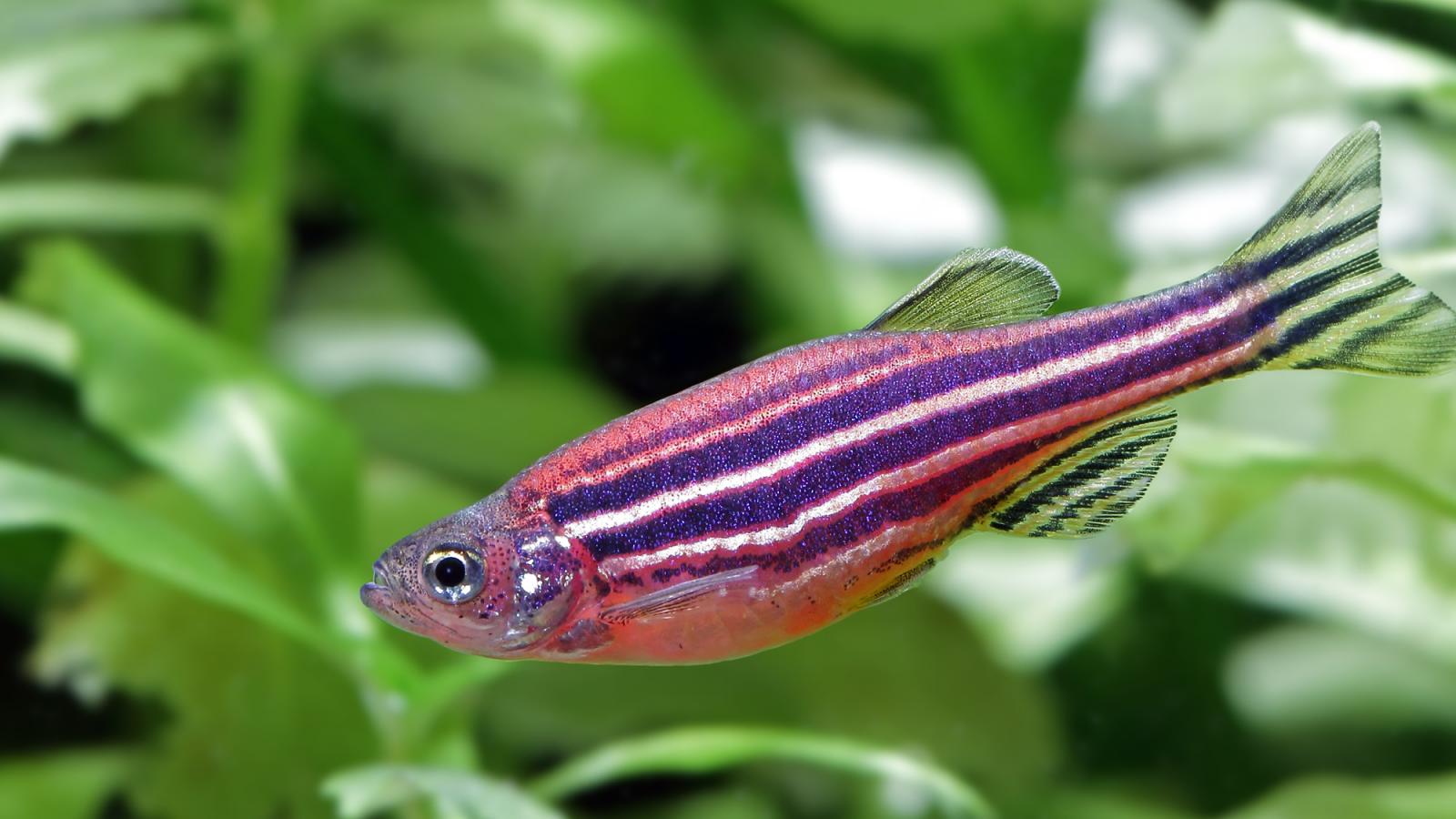
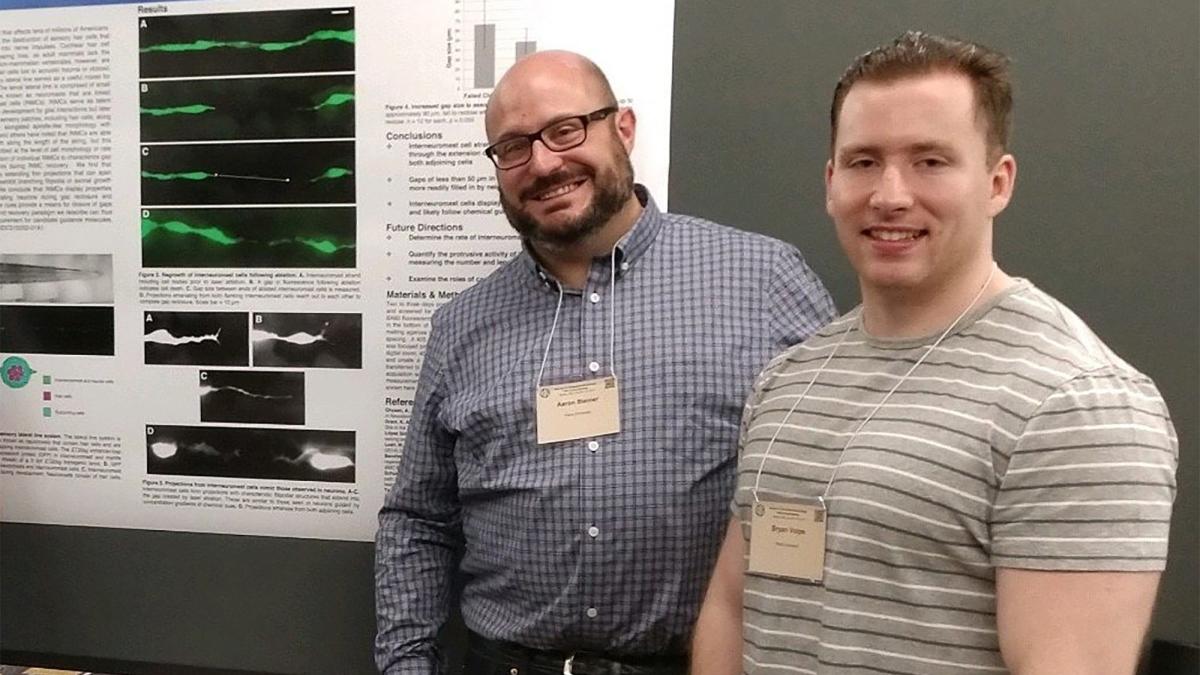
Bryan Volpe ’20 is a biology major with an eye for detail and a mind for the medical field. His interest in Pace started early; he went the extra mile and sat in on a few biology classes on the Pleasantville Campus when he was still in high school. But it was the size of those classes that struck him: there were no more than 30 students per professor. “That kind of collegiate atmosphere is a rarity in universities throughout [the US], specifically in the scientific community. Many biology and chemistry students [...] often feel like just another number in their major due to the sheer volume of students,” Volpe told us. “I believed in Pace’s capacity to provide me with the mentorship and direction that I needed to grow as an individual.”

Taking advantage of those very mentoring opportunities early on, Volpe began conducting groundbreaking research with Dyson Assistant Professor of Biology Aaron Steiner, PhD, who he’s been involved with for over two years now. Along with Leslie Sanchez ’18, the three have been studying regeneration of hair cells in zebrafish. They hope to be able to apply positive findings to better understand how hair cell regeneration can potentially work in the human body. “I’ve always been compelled by the desire to disentangle the underpinnings of biological phenomena; driven by the chance to connect molecular dots,” Volpe explained.
“This great mystery and the chance to solve it is what draws me back to the lab every single week,” he continued. “There’s no place I’d rather be—energy pulses through my veins like electricity through a power line when I’m in [the] lab conducting confocal imaging of interneuromast cells.” This past July, their group presented at the national conference in Boston for the Society of Developmental Biology.
Of his numerous positions at a variety of work placements over the years, Volpe has also completed a staggering 561 hours of intensive clinical shadowing at The Valley Hospital of Ridgewood, NJ, where he was accepted into their physician shadowing program. “I specifically functioned as a pre-medical student where I was extensively instructed and taught by powerful physicians. Their wise teachings and my time with them not only bolstered my foundational knowledge base, but also provided me with direction,” Volpe explained.
All throughout his time at the hospital, he diligently carried a notebook everywhere with him. When people asked why, he answered with just one word. “Effort,” Volpe said. “To me, effort exists within all of us. No one can give us effort—it can only emanate from the decisions that we make pertaining to decisive action.” He filled each of those notebooks with annotations regarding his observations with each physician. It’s that kind of dedication that exemplifies the work ethic Volpe so clearly has.
There is, perhaps, no better example of this than a story he shared with us about his mentor at the hospital. Previously, the long-standing record was 15 patients transported in seven hours. They shattered that record by transporting 18. “We kept up that pace for the next three weeks, and individuals throughout the hospital began to notice us. I was cognizant of the fact that when coupled with hard work, modest tasks can give birth to extraordinary opportunities,” Volpe said, and he was right. “I was invited to shadow an RN in the cardiac unit, [and] she eventually pulled some strings to get me into the coronary catheterization lab.” He got to witness a patient’s heart being saved—and his mind was blown. “Since that moment, there hasn’t been an hour that has passed where I haven’t thought about going to medical school or getting my MD.”
Volpe has called his journey a “metamorphosis” over years of dedication and effort. We look forward to hearing about more of his many accomplishments in the future—and the patients he will inevitably save.
The Digital Journalist
You’ve probably heard the name Jj Perdido ’23. He’s a long-time writer and current sports editor for the Pace Chronicle, an Orientation Leader, an Alpha Chi Rho brother, and a first-gen mentor—to name only a few roles he’s held. This wordsmith has some wise words to share!
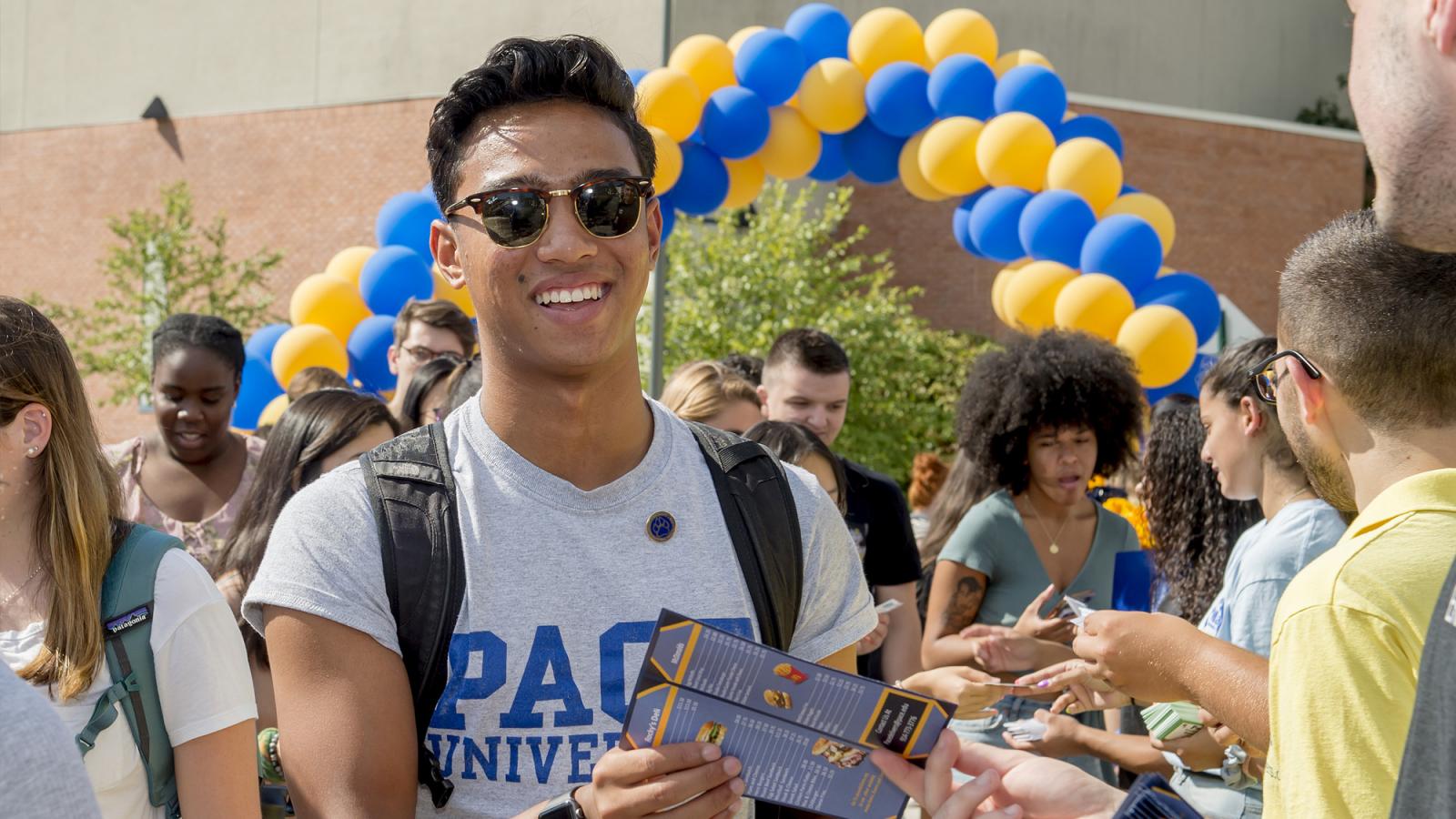
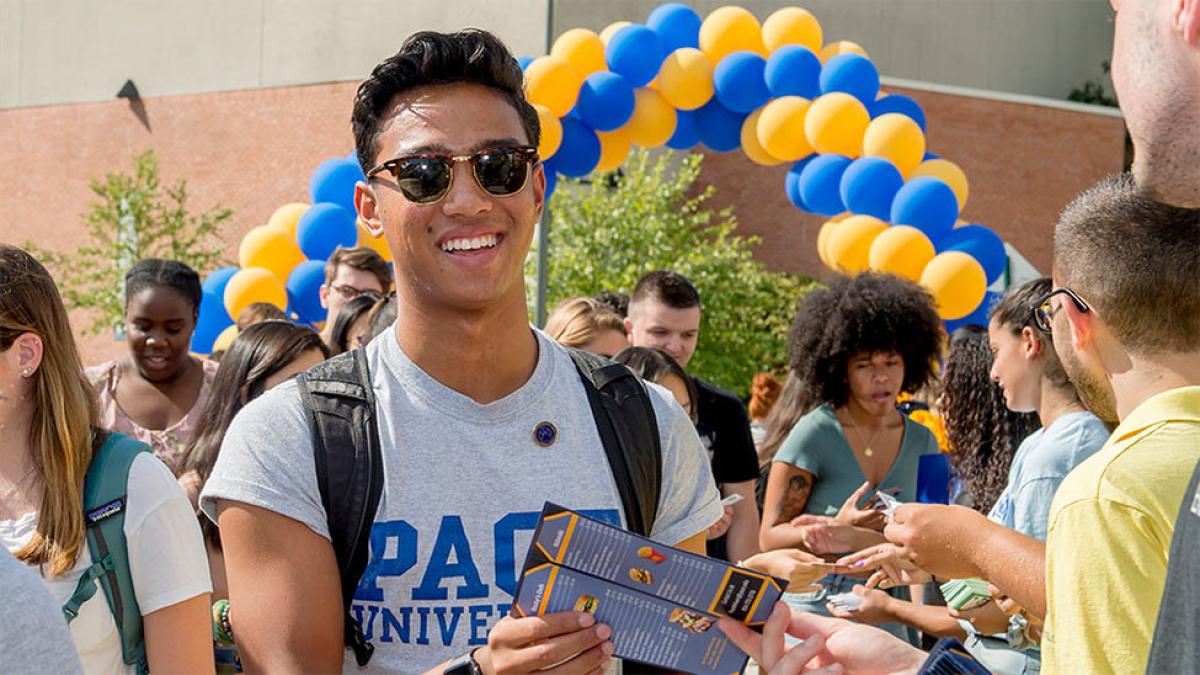
Jj Perdido ’23 knows who he is and what he wants, and he’s driven to achieve every goal he sets for himself. As a digital journalism major and regular contributor to the Pace Chronicle, the student-run newspaper on the Pleasantville Campus, Perdido has taken on many responsibilities in his tenure here. He’s a first-generation student mentor, an Orientation Leader, and a member of both the Setters Leadership Program and Alpha Chi Rho fraternity—all roles he’s served with pride. “The one thing I want out of life is to become a father and teach my children how to become more successful than me. And hopefully the people [who] I have the chance to influence can take that same mentality of setting up those you affect to become more successful than you,” Perdido told us.
Those leadership qualities started early on when he joined his high school’s morning news show, The Warrior News, in his sophomore year. “I really felt in my element and that being a news anchor [was] definitely what I want[ed] to do,” Perdido explained. “I think it’s very important to know what is going on in your community and [the] world. That is what news brings you.” He also discovered his love of writing then, too, which set him on the path of pursuing a career in journalism. “There’s something about the simplicity of it; putting your thoughts on paper is so appealing to me. We’ve been doing it in different forms for hundreds of years and it evolves slightly, but still has so much impact.”
When it came to choosing a college, Pace seemed like a natural fit. And when Perdido toured the Pleasantville Campus, his decision to apply Early Action was solidified. “I’ve loved every second here, have met many people, and have gotten more opportunities to get involved than one person could ever handle,” he told us, and he’s certainly taken advantage of everything we have to offer. Recently, Perdido was named sports editor for the Pace Chronicle, which involves a lot more than just writing articles. “I reach out to our sports representative and let him know what I want to write about, and he’ll set me up with an athlete to interview. The most difficult part is scheduling it, since I am usually busy, as well as the athlete, as well as our sports representative. It typically works out, but that is probably the biggest challenge,” he explained.
As a journalist, Perdido has had to hone his people skills, which he said he initially picked up from two unlikely jobs: one at a moving company near his hometown in Pennsylvania, and another with Pace’s IT Helpdesk as a student assistant. “To put it into perspective, there are certain ways that we have to carry different pieces of furniture,” Perdido said of his moving job. “Some can be anywhere from 200 [to] 400 pounds. There have been times where we will begin to carry a large couch, for instance, and halfway to the trailer, the client will ask us to turn around and bring it back because it is not supposed to go.” Uh, yikes.
On the flip side, in his job for the IT Helpdesk, Perdido was faced with client requests that his department didn’t handle, such as, for example, with Blackboard, which another team is in charge of. “The problem is, [they’re] usually very backed up and may take a couple days to fix individual problems. Some people cannot wait that long and have exams or assignments due hours or minutes after they call us. It’s difficult to tell them that there’s nothing we can do in a stressful situation for them,” he said. Sounds like he had to cultivate a lot of patience and dedication, and it shows in all his work—particularly as a member of Alpha Chi Rho.
“My fraternity’s motto is ‘Be Men,’” Perdido told us. “I think being a man means to care for those around you and to be a beam of light for those you can be one for. I definitely think that trying to influence those around you in a good manner is one of the most important things that you can do in life. My fraternity has taught me that.” Wise words.
It’s clear that in everything he does, Perdido is passionate about affecting change and giving back to his community. We’re so excited to see what he achieves next! You can say you knew him when.
The Ardent Accountant
Aissatou Gningue ’22, majoring in both public accounting and political science with a minor in pre-law, is eyeing a career at the United Nations one day. For now, though, she’s racking up internships and launching her own student club.
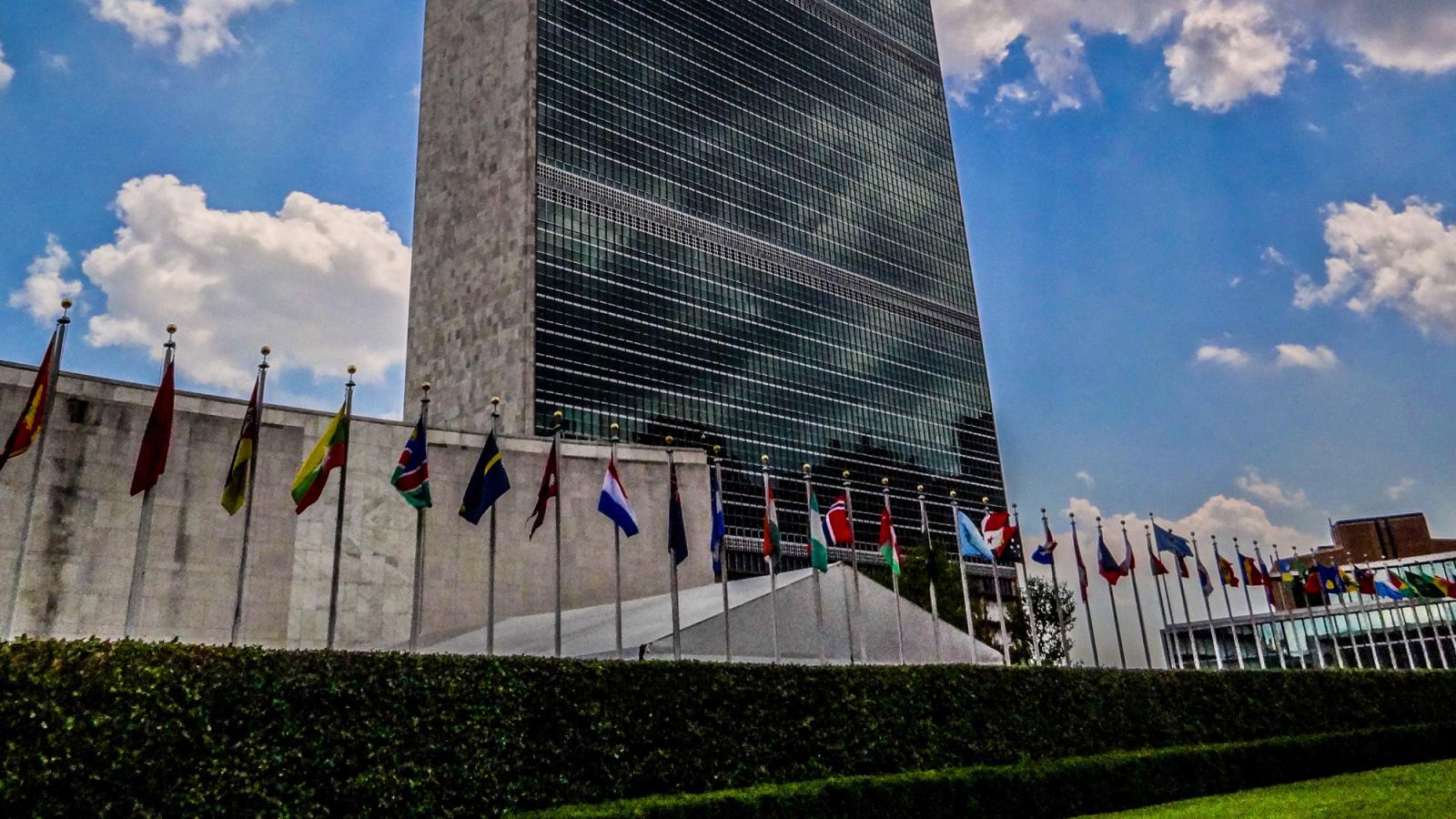

Double major Aissatou Gningue ’22 was already preparing to commit to another college when she happened to schedule a tour at Pace. The experience left such an impression, it caused her to seriously reconsider her plans. “The way I was welcomed by the students I spoke to, the possibilities presented on campus, and the fact that I would stay in New York was a game changer for me,” she told us. She also ended up choosing Pace for the opportunities the University provided, something Gningue didn’t waste any time taking advantage of.
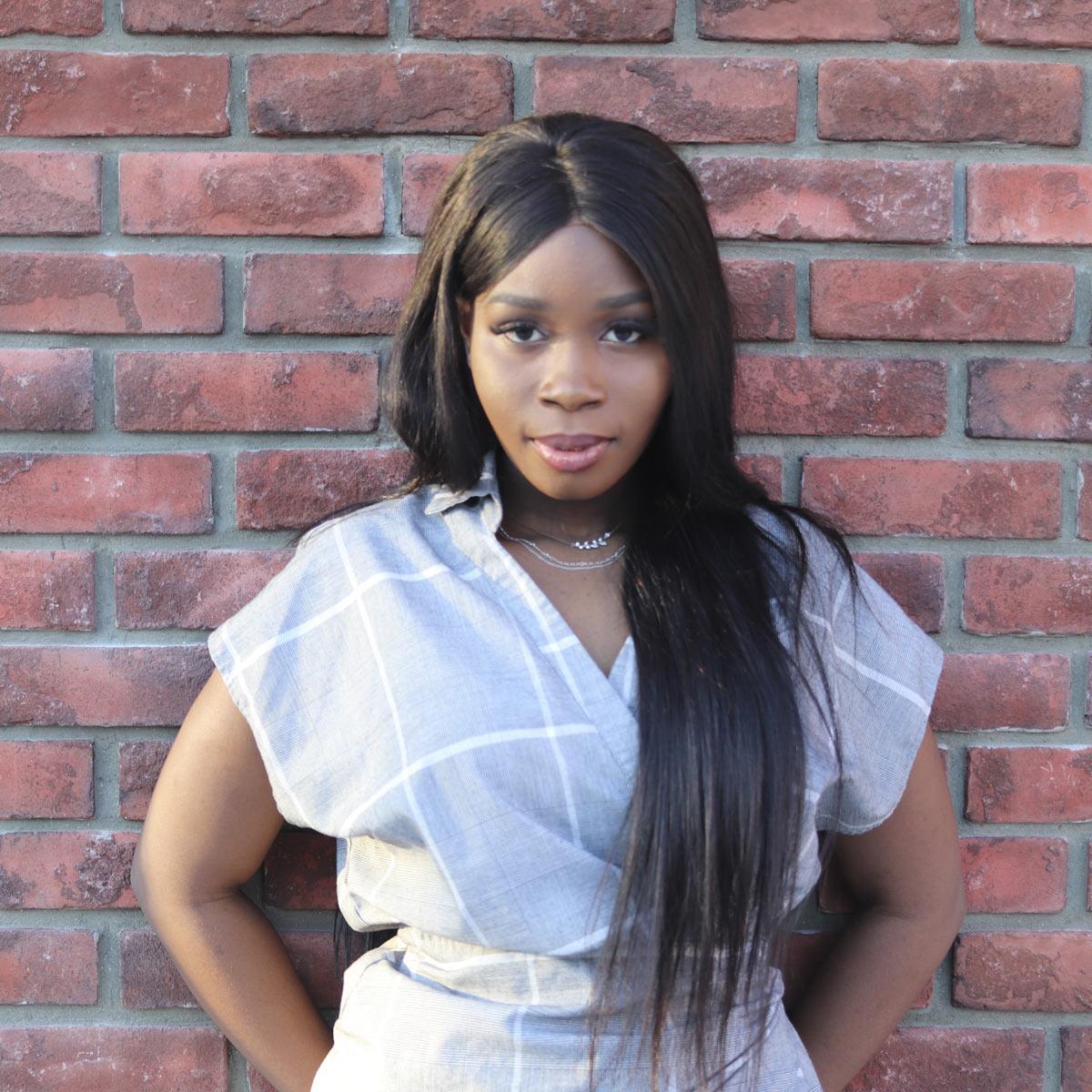
Currently, she’s pursuing a dual major in both public accounting and political science, and even added a pre-law minor to her busy schedule. “I ultimately want to go to law school to study international law,” she explained, her sights set on eventually working in foreign policy at the United Nations (UN). Gningue dreams big! For now, though, she has a solid plan in place on her way to the UN, which involves focusing her talents on learning more about the auditing process. “I spoke to accounting professionals while [I was] figuring out my major, and I found out that accounting is something I would like to pursue while on my journey [toward] something I am also passionate about.”
As practical as Gningue clearly is, she’s also passionate about a lot—and that includes her many, many extracurricular activities. She not only participates in intramural volleyball games, she’s also an active member of the National Society of Leadership and Success, Phi Mu Psi Delta Chapter, and Beta Alpha Psi. These things, she says, were motivated largely by her parents. “I always strived to do well in school because starting at a young age, they gave me the extra push to be the best at whatever I want to do,” Gningue told us. “They set the bar really high and continue to encourage me to go above and beyond.”
In her time at Pace, Gningue has worked in numerous industries from tutoring to sales to counseling all the way to an internship at the New York City Law Department. “My perspective on law completely shifted,” she explained, having worked with law practitioners, former lawyers, judges, and even Mayor Bill de Blasio’s legal team there. It gave her a real sense of the world she would be entering into after graduation. “I learned how policies and the legal system as a whole impacts society and can be used to mitigate issues around the world, including my country, Senegal.”
Like every good legal professional, Gningue is always working to bring people together and foster a greater sense of camaraderie. That’s why she’s working on launching a brand new student organization on the NYC Campus called The Nomads. “The club strives to build a community within Pace to help students meet new people, collect and commemorate memories, and make the most of their college experience,” she told us. “I sincerely hope it will [bring] the Pace Community together and celebrate diversity and inclusion.” We’re excited to see this project flourish!
Did you know her mother is also attending Pace right now, though? It’s true! She already has an MBA in Finance, “but after coming on [a] tour at Pace, she decided to get her master’s in accounting and is on [the] CPA track,” Gningue said. Talk about a Pace legacy story!
We look forward to hearing more about the next big project Gningue decides to take on and pioneer, as well as all the numerous work opportunities we’re sure she’ll be landing on her path to the United Nations. Ambition like that never sleeps, and Gningue is as passionate as they come.
Related Stories
Rachel Vetterman ’22 transferred to Pace to pursue a combined degree: a BA in Childhood Education and an MSEd in Special Education. She’s passionate about supporting all the students she’s worked with, but it was one moment on the job that really changed her perspective.
Pforzheimer Honors College student Debra Perlman ’21 has been extremely busy in her time here at Pace. She’s been part of the first-year and second-year honor societies, Alpha Lambda Delta and Lambda Sigma, a member of the Pace Women in Tech organization, a participant in Pace’s NYC Design Factory, and even a 2019 Forbes Under 30 Summit scholar—not to mention her internships with major companies.
The Passionate Educator
Rachel Vetterman ’22 transferred to Pace to pursue a combined degree: a BA in Childhood Education and an MSEd in Special Education. She’s passionate about supporting all the students she’s worked with, but it was one moment on the job that really changed her perspective.

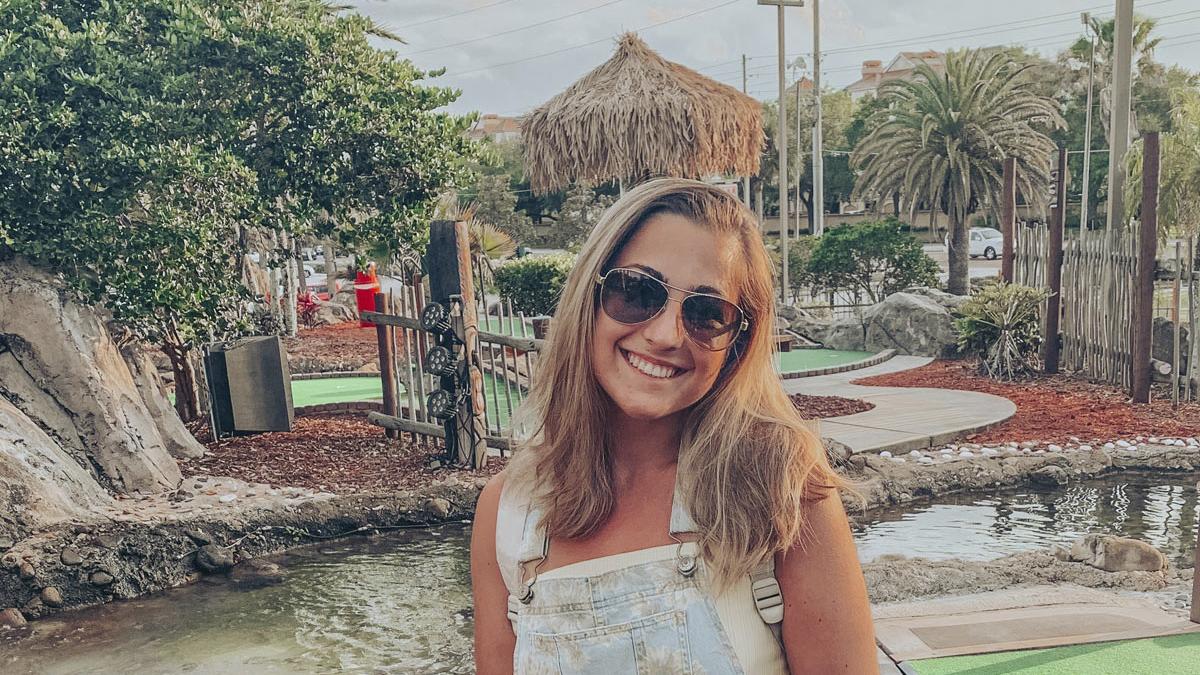
Rachel Vetterman ’22 has wanted to become a teacher since she was little. “I loved to play school,” she enthused. “I played it so often that my dad actually made me my very own chalkboard using chalkboard paint and pieces of wood for the frame.” That passion for education eventually led her to participating in her high school Students Assisting Students program. “[It] allowed me to go back to my old first grade classroom and help out,” Vetterman told us. “The experience solidified my love for teaching and the incredible guidance from my former teacher inspired me to become an elementary school teacher as well.”
With her heart set on teaching in New York, she had the unique perspective of being a college transfer student, which meant Vetterman got to be choosy when it came to her next move. That’s what brought her to Pace. “[The] School of Education is top notch,” she told us. “They really prepare their students for the teaching field.” She was also interested in the fact that Pace students start their training in the field earlier than most universities. “That opportunity was impossible to pass up,” Vetterman explained.
She has held numerous student teaching positions over the years, most recently at the Ossining Union Free School District. There, she organized and distributed homework and classroom supplies, worked directly with teachers to develop education plans, administered tests and quizzes, supported classwork and projects, graded, and much more. But it was a moment with a student in one of her previous positions that really hit home for her.
“One time, my mentor teacher and I were in the classroom eating lunch when one of our students came in crying,” Vetterman told us. “We immediately asked her what was wrong, and she shared that she had been experiencing terrible anxiety for the past few days. [...] It was so heartbreaking to see my student hurting like that at such a young age.” She said that was a turning point for her in her career, something she wouldn’t forget. “[It] made me realize that as a teacher, I have to be more than just an educator. I need to be a friend, a role model, and a confidant.”
It’s that level of enthusiasm and sincere dedication for her work that impressed the Pace chapter of the Tau Sigma National Honor Society, and they recently extended an offer of membership to Vetterman in the spring. “Due to COVID-19, however, we were never able to have an induction ceremony,” she said. Hopefully it happens soon! We look forward to hearing about her much-deserved induction to Tau Sigma after all her incredible work.
Looking ahead to the future, Vetterman will be completing her BA in Childhood Education in May 2021. From there, she will continue on to receive her MSEd in Special Education, to be completed in May 2022. It’s truly impressive how, even as a transfer student to Pace, she’s taken every opportunity available to her and pursued a combined degree program to get the most out of her time here. We’re excited to see where she goes next!
Little known fact, though: Vetterman used to participate in musical theater for many, many years. “I have won two National Youth Arts Awards for different roles that I have played,” she told us. So cool!
Now join us for National Transfer Student Appreciation week as we celebrate incredible transfer students like Vetterman who bring so much to Pace and the students she is so passionate about supporting.
Research Report
From charting the impact of COVID-19 lockdowns to uncovering a forgotten chapter of history, Dyson College faculty members have provided new understanding on a variety of topics recently. Here’s a closer look at their work.
From charting the impact of COVID-19 lockdowns to uncovering a forgotten chapter of history, Dyson College faculty members have provided new understanding on a variety of topics recently. Here’s a closer look at their work.
COVID lockdowns and PSY Health
Has the strain of mandatory COVID-19 lockdowns affected your mental health? The psychological toll has been widely discussed in the media, and now, a new analysis from Pace University Associate Professor of Psychology Anthony Mancini, PhD, and Gabriele Prati, a researcher at the Università di Bologna, provides groundbreaking insight that indicates we might be more resilient than we thought.
“We found that, in the early stages at least, the effect was quite small,” Mancini said. He and Prati analyzed 25 studies involving more than 72,000 participants, and findings showed no statistically significant negative impact on social support, loneliness, general distress, negative affect, and suicide risk among the general population. However, Mancini also notes that the data was extremely varied, which suggests that the psychological effect of lockdowns may differ depending on factors such as social group or geographical location. This may also be due in-part to the disparate health impact of the pandemic.
The full study, “The Psychological Impact of COVID-19 Pandemic Lockdowns: A Review and Meta-Analysis of Longitudinal Studies and Natural Experiment,” is published in the journal Psychological Medicine.
Unlocking the Secrets of Bee Propolis
Propolis, a sticky residue produced by bees and used in the construction of hives, has been recognized for its medicinal properties since ancient times. Today, Pace University Associate Professor of Chemistry Elmer-Rico Mojica, PhD, and his students are working to gain a better understanding of the material.
“[Propolis doesn’t] have exact composition since its chemical make-up is dependent on many factors like location, bee species and season,” said Mojica. “What we are trying to do is to find out if we can have some sort of a chemical marker that can identify that one propolis sample from a particular place.”
To understand how it might be possible to differentiate between propolis samples, the first step is to determine optimal methods to extract the propolis. Mojica recently published new findings in the LSUA Undergraduate Journal in Teaching and Research that demonstrate the efficacy of using ultrasonification (ultrasonic sound waves). He completed the study, “Comparative Study of the Extraction Methods for the Instrumental Analysis of Bee Propolis,” with Lyric O. Wyan ’19, BS Forensic Science, and Jozlyn Charland ’20, BS Forensic Science.
The research is ongoing with other students, and Mojica recently had papers accepted for publication in the Philippine Journal of Science and the Journal of Tropical Life Science.
The Impact of Online Dating Service Advertising
In the world of online dating services (ODS), advertising may be the third wheel, according to award-winning new research from Assistant Professor of Communication Studies Aditi Paul, PhD. Her findings, presented recently at the 7th International Communication Management Conference, showed that advertising messages for ODS are standardized globally, not aligning with the values of different cultures. “Consistent exposure to such standardized advertisements can transform people’s dating practices,” Paul said.
Inspired by a Stanford University study, "How Couples Meet and Stay Together," Paul has worked on her project since 2018, in collaboration with Saifuddin Ahmed, a researcher at Nanyang Technological University, Singapore. Their paper, “Does Online Dating Promotion Vary Across Cultures? Analyzing Homepage Advertisements of Online Dating Services in Fifty-One Countries Across Europe, North America, and South America,” was awarded $5,000, first place recognition at the conference, held virtually and hosted by MICA, a strategic marketing and communication institute in Ahmedabad, India.
“Because of the pandemic, both Dr. Ahmed and I have not been able to visit our families in India for over a year,” Paul said. “To receive this recognition at a conference hosted in India was the closest we got to being home during these extraordinary times.”
Karolina Zaluski ’04, a business economics major, also assisted Paul with the research.
Survival in Today's Media Market
How can local news organizations, especially digital ventures, ensure survival in today's media market? New research from Department of Media, Communications, and Visual Arts Assistant Professor Mirjana Pantic, PhD, demonstrates that establishing a unique niche is one key strategy.
“It is not enough for local digital media to base their originality on the specific region where they produce the news,” Pantic said. “They need to have certain unique characteristics which are usually reflected in the type of content they provide.”
Supported by a Pace Undergraduate Student and Faculty Research Program grant from the Provost’s office, Pantic worked with Jade Perez ’20, Digital Journalism, and conducted in-depth interviews with ten local news organizations.
Results, published earlier this year in the journal Journalism Practice, indicated that focusing on localized content of particular interest to the specific audience rather than investing resources to cover stories being covered by other larger outlets is an effective approach. Pantic also found that utilizing the talents of emerging journalists and students is beneficial to news websites, as well as the individual journalists.
Unearthing Hidden Women’s History
The Korean War, which began on June 25, 1950, has been referred to in the United States as “the forgotten war,” for the limited consideration it has received in comparison to World War I, II, and the Vietnam War. Assistant Professor of History Michelle Chase, PhD, is working to change that, particularly when it comes to an all-but-forgotten protest movement led by a group of women in Cuba. Her article, “Hands Off Korea! Women's Internationalist Solidarity and Peace Activism in the Early Cold War,” published recently in the Journal of Women's History explores the efforts of the Democratic Federation of Cuban Women, a group active in opposing the war. Members held protests, signed petitions, and wrote letters against engaging Cuban troops in the fighting. One managed to travel to North Korea to collect information on wartime atrocities. Chase’s work is the first scholarly article on the group.
“My article emphasizes the fact that in the early Cold War you did see some interesting expressions of women's activism, including some very radical peace activism that tried to build bridges between women in Latin America and the Caribbean and women in Asia,” said Chase. “It’s an interesting group, because in some ways their protests prefigured events of the 1960s, like opposition to the Vietnam War. In other ways, they anticipated arguments made by second-wave feminists in the 1970s. So, I think it’s a very intriguing story that hasn’t been fully told.”
Dyson Voices: A Conversation with S. Brian Jones
S. Brian Jones, published playwright, actor, and arts educator shares his passions and excitement as the new Assistant Dean for Diversity and Equity in the Arts at Pace.
The published playwright, actor, and arts educator shares his passions and excitement as the new Assistant Dean for Diversity and Equity in the Arts at Pace.
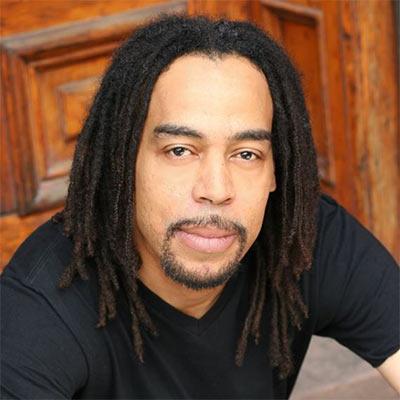
S. Brian Jones, or simply, Brian, is nothing short of a jack-of-all-trades in the theater industry. An actor, playwright, and educator, Jones has inspired underrepresented youth and helped to broaden the mindsets of many through his work. His most well-known plays, including Sister Mother Daughter Wife (2009), Deconstructing Family (2005), and Limited Engagement (2002) explore themes of diversity and cultural identity. Emiliana Hokr, ’21, Communications, met virtually with the new assistant dean recently to discuss his passion for the arts, working with students, and championing diversity, equity, and social justice.
When did you realize you were passionate about the Arts?
I was 9 years old when my godmother took me to see the play Purlie Victorious at Playhouse in the Park. The curtain came up, and I was hooked. For two hours, I forgot everything that was going on in my life. I remember going, ‘I wanna do that. If I can make people forget what they’re going through for two minutes, and lift them up, that’s what I want to do.’ That’s when I knew that it was my passion.
What are you most excited to do for students as the new assistant dean for diversity and equity in the arts?
Everything! I am very student-focused. I want students to know they have me as a resource, an outlet, a sounding board, specifically with topics such as diversity and equity. I’d really love to offer you a space where your voice will be respected.
You have a BA in Communications/Theatre from Rhode Island College and an MA in Applied Theatre from CUNY, School of Professional Studies. How did your own education influence you?
My education and experiences have informed me that whatever path you take, you have to make the decisions that best suit you. I was supported on my path so that I could [empower] other people to take the path that best suits them, not their parents, not their guidance counselors. I started out at a Historically Black College, Morehouse College in Atlanta, Georgia, and had to take a year off for financial reasons. I enrolled and graduated from Rhode Island College later.
How does your writing explore diversity and its relationship to cultural identity?
I’m a very subtle writer. I don’t like to beat people over the head with race, but I want people to have access to cultural identity and what's going on. I want you to look at my characters and say, ‘That could be me, but I’m appreciating that it's African Americans, women, people with disabilities.’
Tell me about your most memorable experience as an actor.
As an actor with Rites and Reason Theatre [founded in 1970 at Brown University], I got to work with Ruby Dee [A Raisin in the Sun]! I was the narrator for a show she was directing. At a performance, I introduced her to my mother, and I watched my mother become a little girl because she was meeting [a celebrity]. It touched my heart so much.
How has teaching changed you as a person?
Completely! When I first started teaching, I was working in a prison program for juveniles. [I learned] that they needed me in that room, they needed my lived experiences, my authenticity. That’s all anybody really wants from [a teacher] because that’s what they can learn and grow from.
What can students do to support and champion diversity, equity, and inclusion?
Be present, open, and honest. We all have to have space for each other, and learn to be okay with being uncomfortable.
About Emiliana Hokr
As a natural extrovert, I have always had a desire to meet new people. I am passionate about hearing the stories of others, their lived experiences, lessons, and adventures; it energizes me when I transform a stranger into an acquaintance. I chose to study communications because it would offer me an outlet to effectively reach more people. Though I do not have a single career set in mind, I know that with the relationships I have fostered throughout my years at Pace, I will be led on the best path that is made for me. Speaking with Brian turned my whole day around. It was a brief interview, but really it was a moment to share, laugh, and connect with a truly exceptional and charismatic individual. His energy was ricocheting through my screen! I’m grateful I had this experience, not only because I got to meet a great administrator, but also because I learned that bringing your authentic self wherever you go will open so many doors for you, and inspire others along the way.
The Art of the Memoir
Nadia Owusu ’05 and Marcos Gonsalez ’15, both authored memoirs that have been published to critical acclaim. Here’s what they had to say about their work.
Nadia Owusu ’05 and Marcos Gonsalez ’15, both authored memoirs that have been published to critical acclaim. Here’s what they had to say about their work.
Nadia Owusu, Aftershocks (Simon and Schuster)
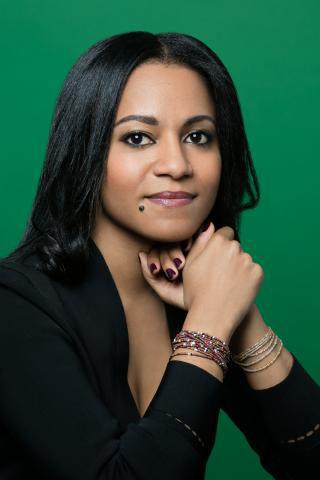
Nadia Owusu ’05, political science, describes Aftershocks as “a literary memoir with threads of cultural history that explores themes like the complexities of family, the multiplicity of identity, the ripple effects, both personal and generational, of trauma, and the meaning of home.” Owusu is truly a citizen of the world. Her father, who was from Ghana, worked for the United Nations’s World Food Program, and her maternal ancestry is Armenian. Growing up she spent time in Rome, London, and East Africa. As well as being a writer, Owusu works as a racial justice organizer and on issues of equitable urban policy.
Released in January 2021, Aftershocks has topped many most-anticipated lists, including The New York Times, O, The Oprah Magazine, Vogue, and TIME. It was well reviewed by The Washington Post, The New York Times, The New Yorker, and others, and Owusu has had the opportunity to speak about it on NPR, podcasts, and at virtual events with independent bookstores across the country. She wrote the book as part of her thesis for an MFA in Creative Nonfiction from Southern New Hampshire University’s Mountainview Low-Residency Program. Her first publication, a lyric essay chapbook titled So Devilish a Fire (2018), is a winner of The Atlas Review chapbook series, and her work has also appeared in publications including The New York Times, The Literary Review, and Catapult. In 2019, she was honored with a Whiting Award, given annually by the Whiting Foundation to ten emerging writers in fiction, nonfiction, poetry, and drama. Writers are awarded “based on early accomplishment and the promise of great work to come.” Past recipients include literary giants Tony Kushner, David Foster Wallace, August Wilson, and Jonathan Franzen.
When did you first start writing?
I’ve been writing since I was very young. I can remember being five or six, and I would sit on the floor in my father’s home office while he worked, writing what I called novels. I’d illustrate them myself and staple the pieces of paper together, and give them to my father to edit.
Describe yourself as a writer.
I write most days. I work full-time for a nonprofit, and I also teach creative writing in an MFA program, so I have to be disciplined about holding time on my calendar to write. That time is sacred. Some days, I only manage to write one sentence. I can revise a single sentence all day. But, writing is a big part of who I am. It’s how I process the world. Most of the time, I’m writing to process questions I’m wrestling with—about myself and about the world. I write to understand more deeply. I don’t always find answers. Sometimes what is revealed is a more precise articulation of the question.
What is your writing process like?
It depends. In an ideal world, I’d have hours and hours to write. I’d sit down in the morning and write until lunch. After lunch, I’d go for a walk to allow the ideas to breathe. Then, I’d come back and revise what I wrote in the morning for a few hours. I’m lucky, though, to have one day like that a month. Most of the time, I’m working with an hour or two between meetings, reading student work, and working on various projects for my day job. I set a timer and I start wherever I left off the day before. Some days, I do very little actual writing. In order to move forward, I find that I need to do a little research. Or, I’ll realize that something doesn’t feel quite right about the voice. So I’ll take notes. I’ll read poetry. I’ll go down a rabbit hole of academic studies. Sometimes, if the writing feels stiff, I’ll take a dance break. Movement is part of my process. How a piece of writing comes together is sort of a mystery to me, even after I’ve finished it.
How did the idea for Aftershocks: A Memoir come about?
I started writing Aftershocks as a private project. I didn’t initially intend to publish it. I was working on a novel at the same time, and I thought the novel was the project I’d share with readers. But, as I said, I write to think through questions, and some of those questions are: Who am I in the world? Where do I fit into the histories of my family? I grew up outside of my parents’ cultures; I wanted a deeper understanding of where they came from. It wasn’t until years later that I went back to that material and wondered if I could make art out of it. Once I started working on that, it just took over. I set the novel aside and focused on this project that became a memoir.
What will you take away from your experience of writing Aftershocks?
Writing the book changed my life in so many ways. I starting writing the book from a place of grief. My mother left when I was two and my father died when I was thirteen. Through the writing, I was able to process what those losses meant in a way I never had before. But, I also found that I was writing toward love and connection. Love is on the other side of grief. Writing the book opened me up to new possibilities and new ways of seeing my relationships to people and places. It also gave me the opportunity to rewrite and revise harmful narratives I had internalized about my history—African history and the history of the Armenian genocide that brought my ancestors to America. Those histories are often ill-treated, as are the stories of families like mine—immigrant families, Black families, families from the so-called developing world. I wanted to narrate myself to deeper understanding of the beautiful and rich histories and cultures of the places my family came from and the forces and private choices that shaped my life.
What do you hope readers take away from the story?
So many of us are struggling with feelings of isolation, dislocation, and disconnection right now. Those are the feelings I reckon with in the book. Through the writing, I discovered how actively people in my life worked to love me, and how actively I held on to love for them, across oceans and continents, and estrangements. We can persevere in loving each other, even when, especially when distance or other forces make it difficult. That’s the biggest message I took away from the experience of writing the book and I hope it’s one that readers can connect to as they navigate these uncertain times.
Aftershocks is your first full-length book. How was crafting this work different than your other short pieces?
I approach everything I write one sentence at a time. I didn’t know that I was writing a book when I started writing Aftershocks. I was just following my curiosities and seeing where they led me. That is a principle that I hope to continue to hold as I write essays, stories, and hopefully, my next book.
What has the response to Aftershocks been like so far?
I am so grateful for the reception it has received and for the conversations it has opened up. The book topped many most-anticipated lists, including The New York Times, O, The Oprah Magazine, Vogue, and TIME. It was thoughtfully and generously reviewed by The Washington Post, The New York Times, The New Yorker, and many others. And, it has been such a joy to get to talk about it on NPR, podcasts, and at virtual events with many incredible independent bookstores. I’ve also had the opportunity, through the launch of the book, to meet so many writers I admire. Building community has been the biggest gift to come from this process.
How do you entwine your work in community development and social change with your writing?
My work as a writer informs my approach to my social justice work, and my social justice work informs my work as a writer.
What’s next?
I’m working on a novel. Its early days, but I’m enjoying the process.
Marcos Gonsalez, Pedro’s Theory (Penguin Random House)
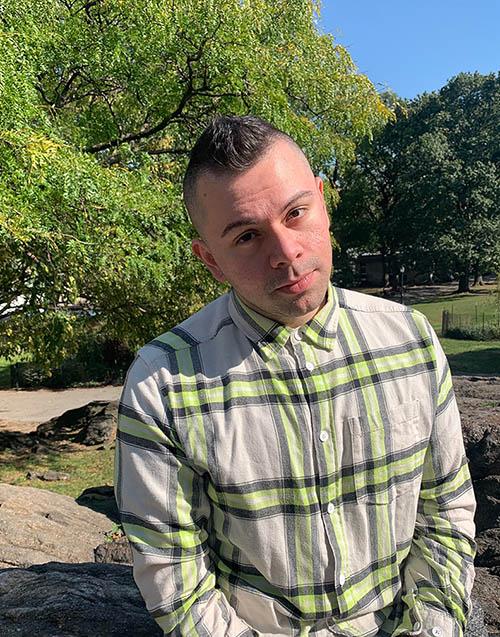
According to author Marcos Gonsalez ’15, English, Pedro’s Theory "is about the quest for understanding one’s past. Putting into perspective the social, historical, and political contexts that shape a childhood which might not have been fully apprehended until later in life. It is about how we work through trauma, and find some way in which to live with it for a better future. The book is about carving out spaces for queer people of color, for seeing how we can make a better and kinder world for all types of people.”
Published in January 2021, the book was named one of 22 LGBTQ+ Books You Absolutely Need to Read This Year by The Advocate, and a Most Anticipated Book of 2021 by LitHub. It was well-reviewed by The New York Timesand Kirkus Reviews.
Gonsalez, an assistant professor of English, is best known as an essayist. His work has appeared in Inside Higher Education, Catapult, The Los Angeles Review, and The New Inquiry.
When did you first start writing?
I actively started writing around age 20. Besides literary criticism for undergraduate papers, I was writing personal essays. Around 24 or 25 is when I started writing more seriously, for publication.
What is your writing process like?
I’m a slow writer. I have to sit with an idea for some time to actually write on it, and once I do start writing, I fuss over the words and syntax I use. Constantly. But this fussing over words, semantics, and language is my favorite part of writing, toying around in order to get to precisely the feel I want, to say exactly what I want how I want to say it. Slow and steady is my motto!
How did the idea for Pedro’s Theory come about?
Pedro’s Theory came about after I started writing my doctoral dissertation. The questions I was asking of literature and critical theory in my dissertation were sparking investigations into my own life and mind. I was seeing linkages between the critical, professional, and personal, and I eventually realized Pedro’s Theory was a separate project from my dissertation. That was when I knew I wanted to write for all kinds of audiences. It was a really exhilarating time.
What do you hope readers take away from the story?
I hope readers see how the critical and theoretical can emerge from life writing. Particularly for marginalized writers, that our lives and experiences can be the stuff of theory.
Pedro’s Theory is your first memoir, correct? How was crafting a memoir different that your other work as an essayist?
Writing a full-length memoir is really tough! You have to think of the through-lines, how all the parts fit together to form some kind of whole. There’s a constant tug-of-war to make sure the book is cohesive. Essays are different, and I love them more, primarily because they are self-contained. I see them as little morsels: small, compact, and you can devour them in a short span of time. I had to adjust my sense of attention and labor when I undertook writing Pedro’s Theory.
What has the response to your work been like so far?
The response has been very great. A New York Times review is something a writer can only dream of! Readers and critics are seeing how this book moves, and what it does, which is motivating since it was a strange little book mixing memoir and literary criticism and cultural commentary. I have had different kinds of readers reaching out to express how moved they felt by the book. I look forward to seeing what further conversations and responses it generates.
What's next?
I’m working now on a book-length study on how queer of color theory speaks to the issues and concerns facing our world. I’m organizing the book around one significant theorist who has shaped my own writing and thinking. I’m really looking forward to sharing this project because it combines biography, theory, history, literary criticism, and autobiography to address a field of study and thinkers that have really changed my life for the better.
CollegeXpress featured Pace University in "Great Graduate Schools With Fully Online Programs"
Alumni Profile: Chris Jones '96, '08
Chris Jones is vice president of communications for FanDuel Group, the leading mobile sports gambling company in the industry. Over the course of his twenty-plus year career, he has moved from a corporate publicist, to an investor relations and mergers and acquisitions communications executive, to chief marketing officer of the largest independent advertising technology company in the world.
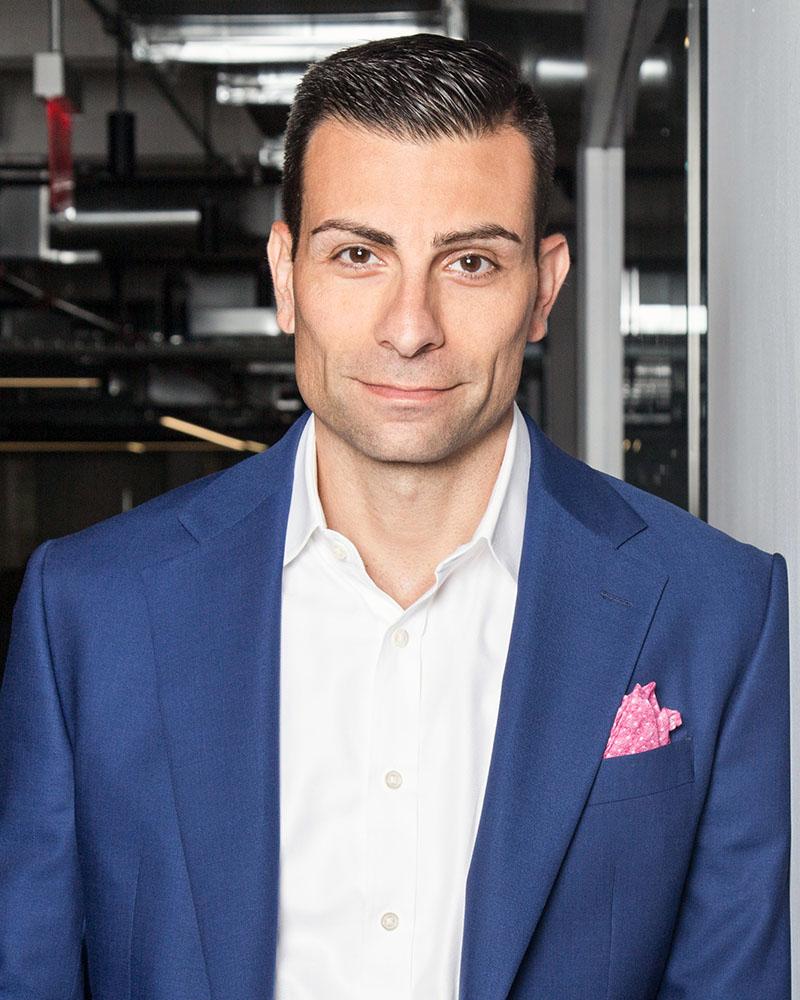
Chris Jones '96 has a confession to make. When he first arrived at Pace, he was "hell bent" on pursuing a career in television news or sportscasting. He wanted to become an on-air talent.
When he enrolled in his public relations class, however, his professor, Donald Ryan, made this Literature and Communications major realize that he was as passionate about curating content as he was about being the focus of it.
It was 1992, and, although Jones didn’t know it then, the trajectory for a successful career was set in motion. He enrolled in several more of Ryan’s classes, served as an editor for Pace’s student newspaper, and became “hooked” on the new direction.
Today, Jones is vice president of communications for FanDuel Group, the leading mobile sports gambling company in the industry. Over the course of his twenty-plus year career, he has moved from a corporate publicist, to an investor relations and mergers and acquisitions communications executive, to chief marketing officer of the largest independent advertising technology company in the world.
“The patchwork quilt of marketing approaches in today’s fragmented media world requires a level of experience and empathy that ensure your tone and associations are understood to be innovative, but also inclusive and responsible to the world we live in,” he said.
A Yonkers and Bronx-bred New Yorker, the professionalism Jones embodies was shaped by tests very early on in his career.
In 1998, he was a junior corporate communications manager when his company was thrust into the largest criminal accounting restatement in modern US business history. Jones was guided through the enormous task of an SEC investigation and subsequent steps to restore the company to fully audited financials, a two-year process that was both a personal and professional learning experience.
It was during this difficult time that he returned to Pace, enrolling in the MBA program in the Lubin School of Business with a focus on managerial marketing.
“I wanted a practical MBA, not a theoretical one,” Jones said. “I was working already and needed that real-world acumen, and Pace was the choice.” As far as enrolling anywhere else–well, all bets were off.
He knew he could rely on his alma mater to create the opportunities that would allow him to go further.
In the increasingly complex and challenging climate of today’s workplace, Jones advises students to not skip the steps necessary for success, but instead, to be patient, receive advice from trusted sources, and embrace hard work.
“While an Ivy education is wonderful, I identify with that [go-getter] Pace grind,” Jones said. “It still empowers me today.”
